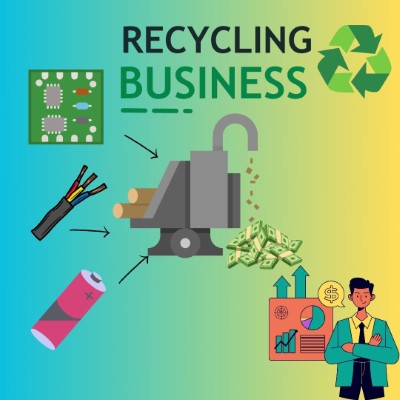As the world grapples with the challenges of waste management and environmental sustainability, recycling has emerged as a crucial solution. In 2024, starting a recycling business is not only a financially sound decision but also a significant contribution to the planet’s health. This article explores the various categories of recycling businesses, the processes involved, and the benefits and future scope of the industry.
Categories of Recycling Businesses
1. Lithium-ion Battery Recycling
Lithium-ion batteries power our smartphones, laptops, and electric vehicles, but they also pose significant environmental hazards if not properly recycled. Recycling these batteries can yield high-value materials such as Black Mass, copper, and aluminum.
Materials Obtained:
- Black Mass: Rich in cobalt, nickel, and lithium, essential for producing new batteries.
- Copper and Aluminum: Used in various industries, reducing the need for mining new materials.
2. PCB (Printed Circuit Board) Recycling
PCBs are found in almost all electronic devices. The recycling process involves dismantling, crushing, and separating the components.
Materials Obtained:
- Copper: Used in electrical wiring and components.
- Resin Powder: Can be reused in manufacturing.
- Electronic Components: Salvaged for reuse or precious metal extraction.
3. Solar Panel Recycling
With the rise of solar energy, the recycling of solar panels has become essential. The process includes removing the aluminum frame and glass, followed by grinding.
Materials Obtained:
- Glass: Can be reused in new panels or other applications.
- Aluminum: Reused in manufacturing.
- Silicon: Reclaimed for use in new solar cells.
4. Recycling Waste Aluminum Composite Panels (ACP)
ACP waste is prevalent in the construction industry. The recycling process involves separating aluminum from plastic using high temperatures.
Materials Obtained:
- Clean Aluminum Sheets: Reused in various applications.
- Recycled Plastic: Utilized in manufacturing.
5. Electric Wire Scrap Recycling
This involves shredding the wires and separating copper from the plastic insulation.
Materials Obtained:
- Copper Granules: Reused in electrical wiring.
- Plastic Insulation: Recycled into new plastic products.
6. Plastic Lumps Recycling
The first step is shredding the plastic lumps using a single-shaft shredder. The shredded plastic is then processed for further recycling.
Materials Obtained:
- Plastic Pellets: Used to manufacture new plastic products.
The Shredding Process and Machines
Shredder Machine
A shredder machine is a crucial piece of equipment in the recycling process. It reduces the size of various materials, making them easier to handle and process further.
Shredding Process
The shredding process involves feeding waste materials into the shredder, where they are cut into smaller pieces by rotating knives. The type of shredder used depends on the material being processed.
Types of Shredders:
- Single Shaft Shredder: Ideal for plastic lumps due to its powerful knives and stable structure.
- Double Shaft Shredder: Suitable for metal, plastic, e-waste, and rubber tires due to its dual shafts and robust design.
Why Start a Recycling Business?
Environmental Benefits
Recycling reduces the need for new raw materials, conserving natural resources and reducing pollution. It also helps in managing waste effectively, preventing it from ending up in landfills or oceans.
Economic Benefits
The recycling industry is growing, with increasing demand for recycled materials. Entrepreneurs can tap into this market, benefiting from government incentives and a steady supply of recyclable waste.
Future Scope
The future of the recycling industry is bright, with advancements in technology and increasing awareness about sustainability. Innovations such as automated sorting systems and advanced recycling methods are making the process more efficient and profitable.
Conclusion
Starting a recycling business in 2024 is a smart and sustainable choice. With various categories to explore, from lithium-ion battery recycling to plastic lumps, there is a wide range of opportunities. The benefits of recycling are manifold, including environmental conservation, economic gains, and a promising future. By investing in the right equipment and processes, aspiring entrepreneurs can build a successful recycling business that contributes positively to the planet.

